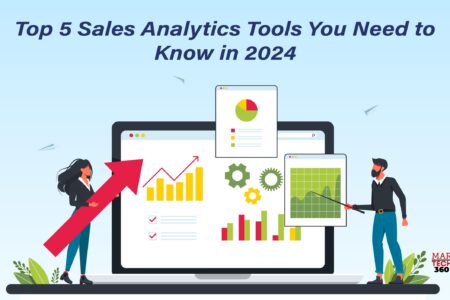Sales analytics tools are a game-changer – they’re not just something nice to have; they’re a must for any organization, no matter the size. They open up a whole world of insights into your sales game, customer vibes, and the overall health of your business. When you roll with the right tools and strategies, sales analytics becomes your secret sauce for making smart, data-driven decisions that fuel business growth.
If your remote team project management tool sees a surge in sign-ups but not in revenue, your sales funnel might have a bottleneck. Sales analytics can pinpoint issues like low conversion from free trials to paid subscriptions. Analyzing data reveals users not fully exploring the product. Implementing an onboarding process can enhance their experience and address the problem.
Let’s learn more about these tools in this guide.
An Introduction to Sales Analytics Tools
Sales analytics tools are powerful solutions designed to collect, analyze, and interpret data related to sales performance, customer behavior, and market trends. These tools provide a holistic view of the sales process, enabling organizations to optimize strategies and enhance overall efficiency.
Features of Sales Analytics Tools
Due to the extensive range of information sales and marketing analytics tools gather, these platforms offer a variety of beneficial functionalities. Here are a few examples of the features that are frequently utilized.
Sales data: Sales analytics provides crucial data on performance, operations, and customer service. Track lead yield, conversion rates, and deals won to assess pipeline success and goal alignment. Whatever the question, sales analytics delivers answers.
Sales dashboard: Sales analytics platforms provide a centralized dashboard for team members to access relevant data and reports, allowing customization for specific departments and team needs.
Sales reporting software: A sales report plays a crucial role in providing coherence to the data. Effective CRM software uses data to create visually appealing charts, graphs, and visuals that can be easily comprehended by team members.
Sales forecasting: Sales forecasting tools use historical data to predict future performance, projecting annual earnings and net sales. This aids businesses in goal tracking and informed spending decisions, while also providing insights into industry trends for a competitive edge.
Also Read: A Beginner’s Guide to AI in Programmatic Advertising: Everything You Need to Know
What Are the Key Benefits of Sales Analytics Tools?

Boost sales performance: Analytics reveals key areas for improving sales performance by tracking metrics like win rate. It measures process effectiveness and identifies reps requiring additional support and coaching.
Make well-informed decisions: Businesses can make informed decisions regarding their expenses and workforce if they have a clear understanding of their projected revenue. Using the exponential smoothing technique and monitoring monthly recurring revenue, businesses can forecast their future sales and revenue. The ability to accurately anticipate the future empowers companies to plan with greater confidence.
Establish and achieve goals: Analytics tools enable businesses to set and track performance, revenue, and growth goals. Reports highlight progress, identifying areas for tactic adjustments if goals are not met.
Close more deals: Sales analytics platforms streamline the sales process, aiding in identifying optimization opportunities. Through pipeline tracking and automated analysis, reps can pinpoint customer lifecycle stages, address drop-off points, and make informed adjustments to boost sales. Accurate data is the key to effective decision-making.
Top 5 Sales Analytics Tools in 2024 You Shouldn’t Ignore
1. HubSpot Sales Hub
HubSpot Sales Hub consolidates all of your sales information into a centralized location, providing enhanced convenience for analyzing and enhancing performance. Additionally, it offers improved insights into sales processes and trends, facilitating more precise sales forecasting. With HubSpot, you can effectively monitor your leads and automate workflows to cultivate them into loyal, long-term customers.
2. Copper
Copper CRM provides a comprehensive sales tracking system that offers enhanced visibility into the sales pipeline. By utilizing the analytics dashboard, users can monitor and analyze vital sales data such as the position of leads, pipeline value, revenue trends, win probability, and sales representative performance. This valuable insight empowers you to make more accurate predictions and informed business decisions.
3. Sales Cloud Einstein
Sales Cloud Einstein from Salesforce enables you to utilize AI-powered analytics to enhance your revenue growth. It facilitates the generation of more profitable business strategies by delving into past sales data and discovering valuable insights about your operations. This AI-driven sales analytics software empowers you to enhance your forecasting precision and gain a deeper understanding of customer behavior.
4. NetSuite CRM
NetSuite CRM provides an opportunity to enhance the efficiency of your sales endeavors through the tracking of sales patterns and the collection of valuable insights. With the aid of NetSuite CRM’s business intelligence features, you can delve into sales data to both discover trends and monitor performance. This tool also helps you gain real-time visibility into your sales processes and effortlessly identify areas that can be optimized.
5. Zoho CRM
Zoho CRM empowers you to enhance your business decision-making through its robust predictive engine and analytical features. In addition to assisting you in monitoring the probability of winning your deals, Zoho CRM enables you to visually represent sales data in diverse formats, ensuring that you stay informed while offering impactful business insights.
Summing it Up
Integrating sales analytics tools into your business is no longer a choice but a necessity. These tools empower you with invaluable insights into sales performance, customer behavior, and overall business health. By harnessing the capabilities of these tools, you position your business to make informed, data-driven decisions that are crucial for sustained growth and success in today’s competitive landscape. Embrace the power of both paid and free sales analytics tools and watch your business soar to new heights.

